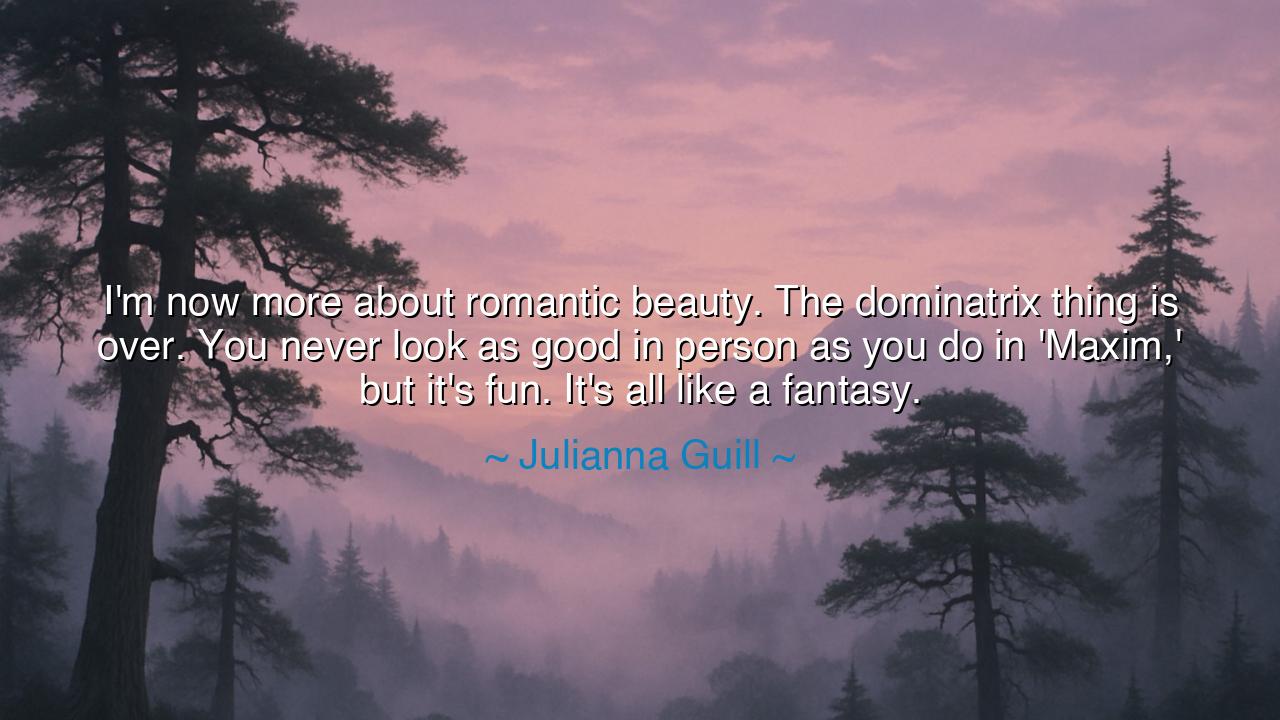
I'm now more about romantic beauty. The dominatrix thing is over.
I'm now more about romantic beauty. The dominatrix thing is over. You never look as good in person as you do in 'Maxim,' but it's fun. It's all like a fantasy.






The words of Julianna Guill—“I’m now more about romantic beauty. The dominatrix thing is over. You never look as good in person as you do in ‘Maxim,’ but it’s fun. It’s all like a fantasy.”—reveal the eternal tension between illusion and reality, between the image fashioned for the world and the truth that lives beneath the skin. Here she speaks not only as an actress and model, but as a woman who has walked through the glittering halls of fantasy and returned with wisdom in her hands. She admits that what is shown in magazines, in Maxim and in the crafted realm of fantasy, is not the essence of the self, but a fleeting image—a mask that shines brightly yet does not endure.
In her declaration, the shift from the “dominatrix” to “romantic beauty” is not merely a change of costume, but a journey of spirit. The dominatrix—fierce, commanding, an image of control—represents one season of identity, a mask worn for power and allure. Yet Guill turns toward another vision, gentler, more tender, more aligned with truth: the beauty of romance. This is a progression many souls undergo, from the desire to conquer, to the longing simply to connect. To prefer romantic beauty over domination is to honor the heart above the mask, intimacy above spectacle.
Her confession that “you never look as good in person as you do in Maxim” carries a powerful truth. The world of images is an enchantment, carefully crafted to magnify perfection and conceal imperfection. But the living human being is not airbrushed, not lit by studio lamps, not arranged for maximum allure. And yet, in this disparity between the real and the ideal lies the wisdom she imparts: that the self in its unadorned state is not diminished by lacking perfection—it is liberated. For perfection is only an illusion, and to know this is to break free from chains woven of false expectation.
History offers us mirrors for this truth. Consider Cleopatra, queen of Egypt, who was said to captivate not merely by her beauty but by her presence, her intellect, and her charm. Roman writers, obsessed with ideals, tried to frame her as a temptress, an illusion of seduction. But her true power was never in painted image—it was in the living reality of her wit, her leadership, her courage. Just as Guill reveals the difference between the image in a magazine and the person who lives beyond it, so too does Cleopatra’s legacy remind us that the image is not the essence.
There is also a lesson about the nature of fantasy. Guill does not condemn it, but acknowledges it as “fun,” as a fleeting realm where imagination can play. And indeed, fantasy has its place—it stirs dreams, inspires desires, and creates worlds of wonder. But to mistake fantasy for truth is to stumble in the dark, forever reaching for what cannot be held. Wisdom lies in knowing the place of fantasy: to enjoy it, but not to be enslaved by it. To step back, as Guill has, and say, “It is all like a fantasy,” is to name illusion as illusion, and thereby regain freedom.
The lesson we must take is this: Do not cling too tightly to the masks that the world places upon you. Do not measure your worth against the glossy perfection of magazines, nor seek to sustain an image that was never meant to endure. Instead, honor the path from the false to the true, from the dominatrix to the romantic, from the performance of power to the living experience of love. Beauty, when stripped of artifice, becomes more human, more lasting, more real.
Practically, this teaching asks us to live with honesty toward ourselves. If you find yourself caught in illusion—whether of appearance, of power, or of identity—pause, and ask: Is this the mask, or is this me? Allow yourself to play with fantasy when it brings joy, but do not confuse it with reality. Cherish the imperfect moments, the unposed smiles, the unpolished truths. These are the true treasures, more luminous than any image upon a page.
Thus, Guill’s reflection, spoken in humility, is a teaching for the ages. The world of fantasy may sparkle, but it is not where the soul finds rest. To seek romantic beauty is to walk toward truth, to embrace tenderness over illusion, and to live in the radiance of what is real. This is the wisdom we must carry forward: that the image fades, but the essence remains eternal.






AAdministratorAdministrator
Welcome, honored guests. Please leave a comment, we will respond soon